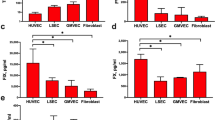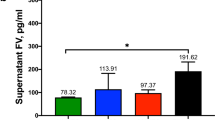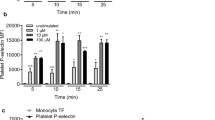Abstract
SYNTHESIS of a potent procoagulant by cells in tissue culture has been demonstrated but its identity is obscure1. Activity is low at the beginning of culture of normal human fibroblasts and increases several hundred-fold after 12–24 h of incubation at 37° C. This increase is readily detected by the one-stage assay for factor VIII (antihaemophilic globulin) but can also be demonstrated by the two-stage factor VIII assay based on the thromboplastin generation test. Studies in progress to characterize this procoagulant have demonstrated a marked increase of factor XI as well as factor VIII activity and evolution of factor XI activity during contact activation with celite. Increase in activity detectable in the one-stage assay for factor IX and XII was much less. The procoagulant was incapable of clotting a fibrinogen solution and no change in assays for factor V and VII was observed during culture.
This is a preview of subscription content, access via your institution
Access options
Similar content being viewed by others
References
Zacharski, L. R., Bowie, E. J. W., Titus, J. L., and Owen, C. A., Mayo Clin. Proc., 44, 784 (1969).
Author information
Authors and Affiliations
Rights and permissions
About this article
Cite this article
ZACHARSKI, L., MCINTYRE, O. Procoagulant Synthesis by Cultured Fibroblasts triggered by Cell Adhesion. Nature 232, 338–339 (1971). https://doi.org/10.1038/232338a0
Received:
Revised:
Issue Date:
DOI: https://doi.org/10.1038/232338a0
Comments
By submitting a comment you agree to abide by our Terms and Community Guidelines. If you find something abusive or that does not comply with our terms or guidelines please flag it as inappropriate.



